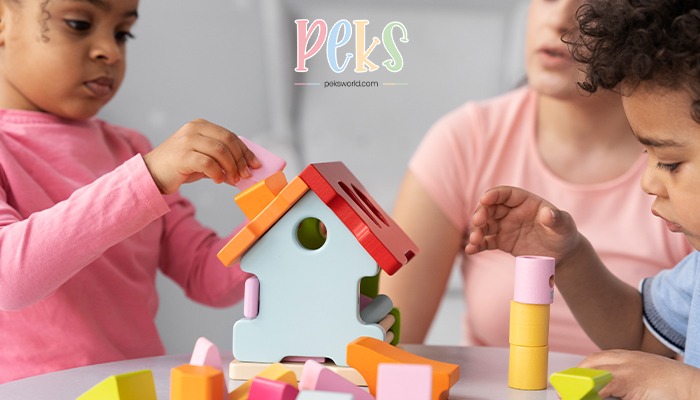Social development plays a pivotal role in a child’s overall growth and well-being. Preschool years mark a crucial period for children to develop their social skills and learn how to interact with others. As parents and educators, understanding the significance of promoting social development in preschoolers is crucial. In this blog, PEKS World, the Best Playway School in Ludhiana, will explain the effective strategies to nurture social development in preschool-aged children.
- Encouraging Play:
Play is an integral part of a preschooler’s social development. It provides numerous opportunities for children to interact, cooperate and develop social skills. Encourage free play in a safe and supportive environment where children can engage in imaginative play, take turns, share toys and negotiate with their peers. Structured group activities and games can also be incorporated to teach teamwork, communication and problem-solving.
- Providing Role-Playing Scenarios:
Role-playing activities can help preschoolers develop empathy and perspective-taking skills. Create scenarios where children can pretend to be different characters or engage in pretend play situations. This allows them to understand different roles, emotions and perspectives, fostering social understanding and enhancing their ability to relate to others.
- Modeling Positive Behavior:
Preschoolers observe and imitate the behavior of adults and older children. As role models, parents and educators should exhibit positive social behavior. Display kindness, patience and respect when interacting with others. Demonstrate effective communication, active listening and problem-solving skills. Through modeling, preschoolers learn appropriate social behavior and develop positive relationship-building skills.
- Facilitating Peer Interactions:
Facilitating peer interactions is vital for a preschooler’s social development. Create opportunities for children to engage in group activities, collaborative projects and cooperative play. Encourage conversations, sharing and turn-taking. Provide guidance on resolving conflicts and teach strategies such as compromising, apologising and forgiving. By fostering positive peer interactions, preschoolers learn important social skills that will benefit them throughout their lives.
- Promoting Diversity and Inclusion:
Expose preschoolers to diverse cultures, backgrounds and perspectives. Incorporate books, toys and activities that celebrate diversity. Teach children about acceptance, tolerance and respect for differences. Encourage discussions about similarities and differences among individuals. By promoting diversity and inclusion, preschoolers develop a broader understanding of the world and learn to appreciate and respect the uniqueness of others.
- Creating a Positive Classroom Environment:
A positive classroom environment is essential for social development in preschoolers. Establish clear rules and expectations regarding behaviour, kindness, and respect towards others. Create a supportive and inclusive atmosphere where every child feels valued and included. Provide opportunities for children to express themselves, share their ideas, and listen to others. Celebrate the achievements and milestones of each child, promoting a sense of belonging and self-confidence.
Conclusion:
Promoting social development in preschoolers is vital for their overall growth and well-being. By utilising effective strategies such as encouraging cooperative play, creating a supportive environment, engaging in group projects, teaching emotional intelligence, fostering problem-solving skills and providing opportunities for peer interactions, PEKS World, one of the Top Kindergarten Schools in Ludhiana, nurtures the social development of preschool-aged children.

